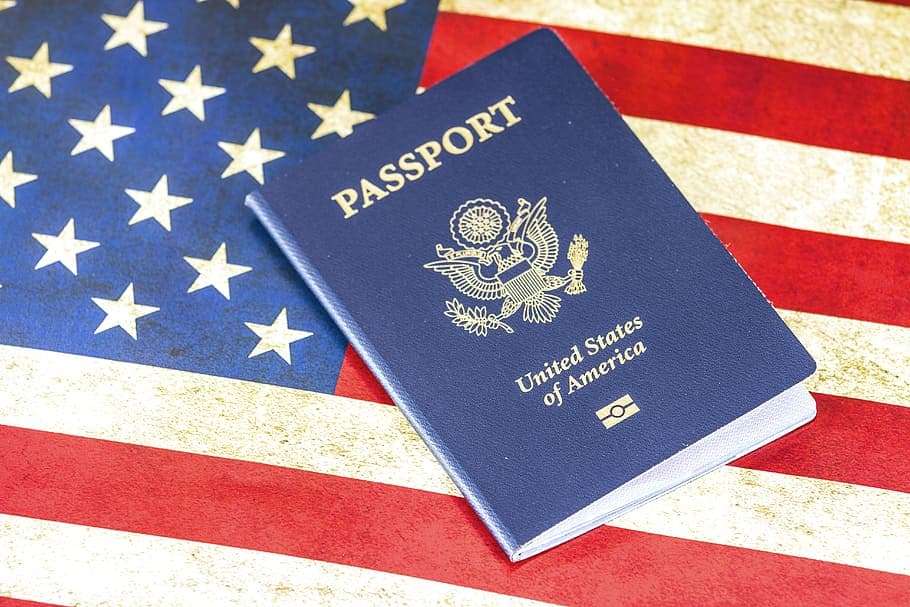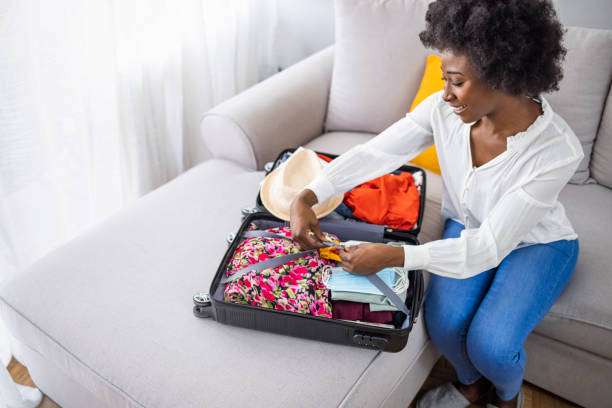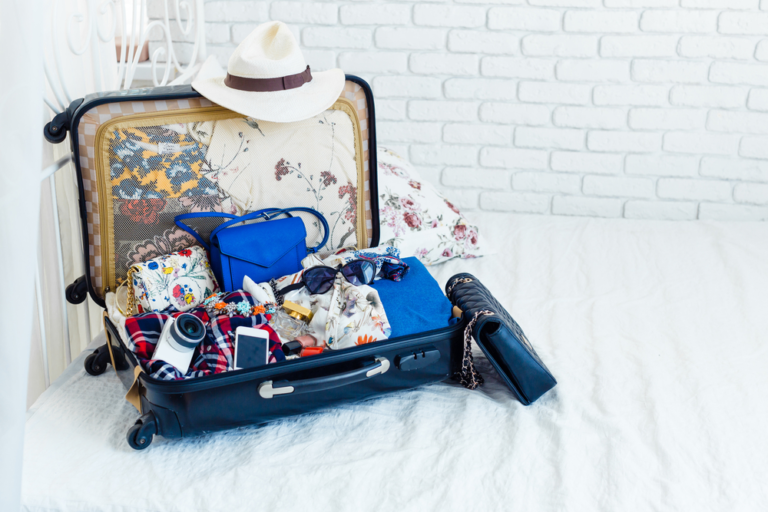As someone who has solo traveled the globe for over 8 years, I wanted to share some practical tips and tricks I’ve picked up along the way. Trust me, international travel is a bit more involved than hopping across states in the U.S., but it’s also incredibly rewarding.
Here’s everything you need to know to get started.

1. Get Your Passport
Before you do anything, GET YOUR PASSPORT! This little booklet is your ticket to the world. Without it, you won’t get very far. The total cost is approximately $150, and it’s good for 10 years. Make sure to apply well in advance of your planned departure date, as processing times can vary. You can apply at many post offices or passport agencies, but check the State Department’s website for the latest information. Don’t forget to check the expiration date on your passport well before any trip. Some countries require your passport to be valid for at least six months beyond your intended stay.
2. Visas: The Other Essential Document
Depending on your destination, you might also need a visa. Some countries allow visa-free travel for a certain period, while others require you to obtain one before arrival. Websites like AVPI or your destination’s embassy site can provide detailed information on visa requirements. For digital nomads, countries like Estonia, Portugal, and Barbados offer special visas that cater to remote workers. Always check the latest requirements as they can change frequently, especially in the post-pandemic world.
3. Notify Your Bank
This is crucial to avoid any embarrassing moments at the checkout counter. Inform your bank that you’ll be traveling abroad. Many banks, like USAA and NFCU, allow you to set travel notifications through their mobile apps. This helps prevent your card from being blocked due to suspicious activity. Also, ask about foreign transaction fees and the best ways to access your money while abroad. Some banks partner with international networks to reduce or eliminate ATM fees.
4. Register with the State Department
Register with the State Department’s Smart Traveler Enrollment Program (STEP). This free service sends you important information about safety conditions in your destination country, helping you make informed decisions about your travel. In the event of an emergency, such as a natural disaster or civil unrest, the local embassy will know how to contact and assist you. It’s a simple way to stay informed and safe.
5. Smart Flight Booking
When booking your flights, use Skyscanner and check prices in different currencies. Sometimes, you can get a deal just by paying in a different currency. It’s one of those travel hacks that can save you a considerable amount of money. Also, consider setting up price alerts to get notifications when flight prices drop. Being flexible with your travel dates and destinations can also lead to significant savings. Always read the fine print for baggage fees and other hidden costs that might not be included in the ticket price.
6. Flexible Hotel Reservations
Whether you use Booking.com, Agoda, or Trip Advisor, always book hotel reservations that offer free cancellations. Plans change, and flexibility is your friend. If free cancellation isn’t available, use a prepaid card with a small balance (like $3) to make the reservation. When you check-in, you can pay with a different card or cash. This way, you won’t be charged for a room you couldn’t stay in due to unforeseen circumstances. Just remember, you might be asked to show the card you booked with, so keep it handy. Also, consider using VRBO instead of Airbnb, which often have more flexible cancellation policies and unique accommodations that can enhance your travel experience.
7. Manage Your Mail
Don’t let your mailbox overflow while you’re away. If you don’t have someone to pick up your mail, get it suspended or forwarded. Sign up for USPS Informed Delivery to receive daily emails about your mail deliveries, so you always know what’s coming. This service gives you a digital preview of your mail, which is especially useful for monitoring important documents. For longer stays abroad, consider using a mail forwarding service that can scan and email you copies of your mail.
8. Embrace eSIM Technology
Traveling with a phone that has eSIM capabilities is a game-changer. An eSIM allows you to have data and make local calls no matter where you are. It’s flexible and cost-effective, letting you pay only for the data you need. Services like Airalo and Saily offer eSIMs that can be activated and managed through an app. This eliminates the hassle of finding a local SIM card upon arrival and ensures you stay connected from the moment you land.
9. Research Local Customs and Etiquette
Every country has its own customs and social norms. Researching these can help you avoid any unintentional faux pas. Understanding local etiquette shows respect and can enhance your travel experience. For example, in Japan, it’s considered rude to tip, while in the U.S., tipping is expected. In many Asian cultures, removing your shoes before entering someone’s home is customary. Knowing these little details can make a big difference in how locals perceive and interact with you.
10. Learn Basic Phrases
While English is widely spoken, learning a few basic phrases in the local language can go a long way. Phrases like “hello,” “thank you,” and “please” are appreciated and can help you navigate daily interactions more smoothly. Apps like Duolingo or Google Translate can help you pick up basic language skills quickly. Even a small effort to speak the local language can create a positive impression and open doors to more authentic experiences.
11. Stay Connected with Apps
There are tons of apps that make international travel easier. Here are a few must-haves:
- Google Translate: For overcoming language barriers. It even offers offline translation and real-time camera translation.
- Maps.me: Offline maps for navigating without data. It’s particularly useful in areas with poor connectivity.
- XE Currency: For quick currency conversions. It also offers charts and rate alerts.
- WhatsApp: For staying in touch with friends and family. It’s widely used globally and supports voice and video calls over Wi-Fi.
12. Health Precautions
Check if any vaccinations are required for your destination. Carry a basic first aid kit with essentials like band-aids, antiseptic wipes, and any prescription medications you need. Travel insurance is also a must-have to cover any unexpected health issues. Look for insurance that covers COVID-19 related expenses, as well as medical evacuation and trip cancellations. It’s also a good idea to carry a copy of your medical records and a list of any medications you take, including their generic names.
13. Pack Light but Smart
Overpacking is a common rookie mistake. Stick to versatile clothing that can be layered and mixed and matched. Invest in packing cubes to organize your belongings and save space. Remember, you can always buy things you need along the way. Think about the climate of your destination and pack accordingly. For instance, lightweight, breathable fabrics are great for tropical destinations, while layers and thermal wear are essential for colder climates. Don’t forget essential tech gear, such as portable chargers, a universal power adapter, and backup storage for your digital files.
14. Financial Preparedness
Carry a mix of payment methods: credit cards, a debit card, and some local currency. Notify your credit card company of your travel plans to avoid any blocks on your card. It’s also wise to have a backup card in case of emergencies. Consider opening an account with a bank that offers no foreign transaction fees. I use Wise, NFCU, and USAA. Always have a small amount of local currency for tips, transportation, or places that don’t accept cards.
15. Travel Insurance
Don’t leave home without it. Travel insurance can cover a range of issues, from medical emergencies to trip cancellations. It’s a small investment for peace of mind. Look for comprehensive policies that include medical coverage, trip interruption, lost luggage, and emergency evacuation. Companies like Genki, World Nomads and SafetyWing offer plans specifically designed for digital nomads and long-term travelers.
16. Local SIM Cards vs. Global Plans
While eSIMs are great, sometimes a local SIM card might be cheaper, especially for longer stays. Compare the costs and benefits of both options to see what works best for you. Local SIM cards often provide better rates for data and local calls. Upon arrival, you can purchase a SIM card at the airport or local shops. Ensure your phone is unlocked to use local SIMs. Research the best carriers and plans beforehand to avoid getting overcharged.
17. Staying Productive
As a digital nomad, staying productive is key. Research co-working spaces in advance and check their reviews. Cafes with good Wi-Fi are also a great option. Invest in noise-canceling headphones to work in noisy environments. Tools like Workfrom and Croissant can help you find reliable co-working spaces. Establish a routine that balances work and exploration to make the most of your time abroad.
18. Safety First
Stay aware of your surroundings and keep your valuables secure. Use a money belt or hidden pouch for your passport, credit cards, and cash. Make digital copies of important documents and store them in a secure cloud service. Avoid flaunting expensive items like jewelry or electronics. Research the safety of your destination and familiarize yourself with local emergency numbers. Trust your instincts and avoid risky situations, especially at night.
19. Cultural Sensitivity
Be respectful of local cultures and traditions. Dress appropriately, especially when visiting religious sites. Be mindful of local customs and try to blend in rather than stand out. This includes understanding local attitudes towards photography, personal space, and social interactions. Engaging respectfully with locals can lead to deeper connections and a more fulfilling travel experience.
20. Explore Like a Local
While tourist attractions are great, try to experience the local culture. Eat at local restaurants, shop at local markets, and engage with locals. This often leads to the most memorable experiences. Use resources like Eat With to discover hidden gems and off-the-beaten-path recommendations. Join local tours or community events to immerse yourself in the culture.
21. Sustainability Matters
Travel responsibly. Reduce your environmental impact by avoiding single-use plastics, supporting eco-friendly businesses, and being mindful of your carbon footprint. Carry a reusable water bottle, shop at local markets, and choose sustainable accommodation options. Many destinations are focusing on sustainable tourism, so look for opportunities to support local conservation efforts and eco-friendly practices.
22. Learn to Cook Local Dishes
Take a cooking class to learn how to make local dishes. It’s a fun way to immerse yourself in the culture and you can impress friends back home with your new culinary skills. Many places offer cooking classes for tourists, where you can learn traditional recipes and cooking techniques. This experience not only enhances your culinary repertoire but also provides insight into the local way of life and food culture.
23. Network with Other Nomads
Join online communities and local meetups for digital nomads. These groups can provide support, share tips, and help you connect with like-minded individuals. Platforms like Nomad List and Meetup offer opportunities to meet other nomads, share experiences, and even collaborate on projects. Building a network can help combat loneliness and provide valuable resources and advice.
24. Keep a Travel Journal
Document your experiences, thoughts, and feelings in a travel journal. It’s a great way to reflect on your journey and will be a cherished keepsake in the future. Whether you prefer writing, sketching, or digital journaling, capturing your travels helps you remember details and personal growth. It can also be a source of inspiration for future trips or projects.
25. Backup Your Data
Regularly back up your important data to a cloud service. Losing your laptop or having it stolen is bad enough without losing all your work and memories too. Use services like Google Drive, Dropbox, or iCloud to ensure your files are safe and accessible from anywhere. Consider carrying an external hard drive for additional backup.
26. Stay Fit and Healthy
Maintain a fitness routine, whether it’s through local gyms, running, yoga, or online workouts. Eating healthy can be challenging while traveling, but try to balance indulging in local cuisine with nutritious choices. Many cities offer outdoor fitness classes or have public parks with exercise equipment. Apps like ClassPass can help you find fitness classes wherever you are.
27. Money Management
Use budgeting apps to track your spending and stick to a budget. Living as a digital nomad can be more affordable than you think if you manage your finances well. Apps like Mint or YNAB can help you monitor expenses, set financial goals, and avoid overspending. Regularly review your budget to ensure you’re staying on track.
28. Learn from Locals
Locals can offer the best advice on where to go and what to do. Don’t hesitate to ask for recommendations and tips on exploring the area. Building relationships with locals can provide insights into hidden gems and cultural experiences that you might miss as a typical tourist. They can also offer practical advice on navigating the area safely and efficiently.
29. Handle Homesickness
It’s natural to miss home. Stay connected with loved ones through regular video calls and messages. Create a sense of routine to help you feel grounded. Carrying a few personal items, like photos or favorite snacks, can provide comfort. Embrace your new environment by creating a home away from home with familiar routines and hobbies.
30. Have Fun and Be Flexible
Lastly, remember to have fun and be flexible. Things won’t always go as planned, and that’s okay. Embrace the unexpected and make the most of every experience. Being adaptable and open-minded allows you to navigate challenges and enjoy the journey. After all, some of the best travel stories come from unplanned adventures.
Final Thoughts on International Travel Tips
Going on an international adventure as a digital nomad is life-changing. While it requires more planning and preparation than domestic travel, but the rewards are immense. By following these tips and tricks, you’ll be well-equipped to navigate the challenges and enjoy your journey.
Safe travels!






